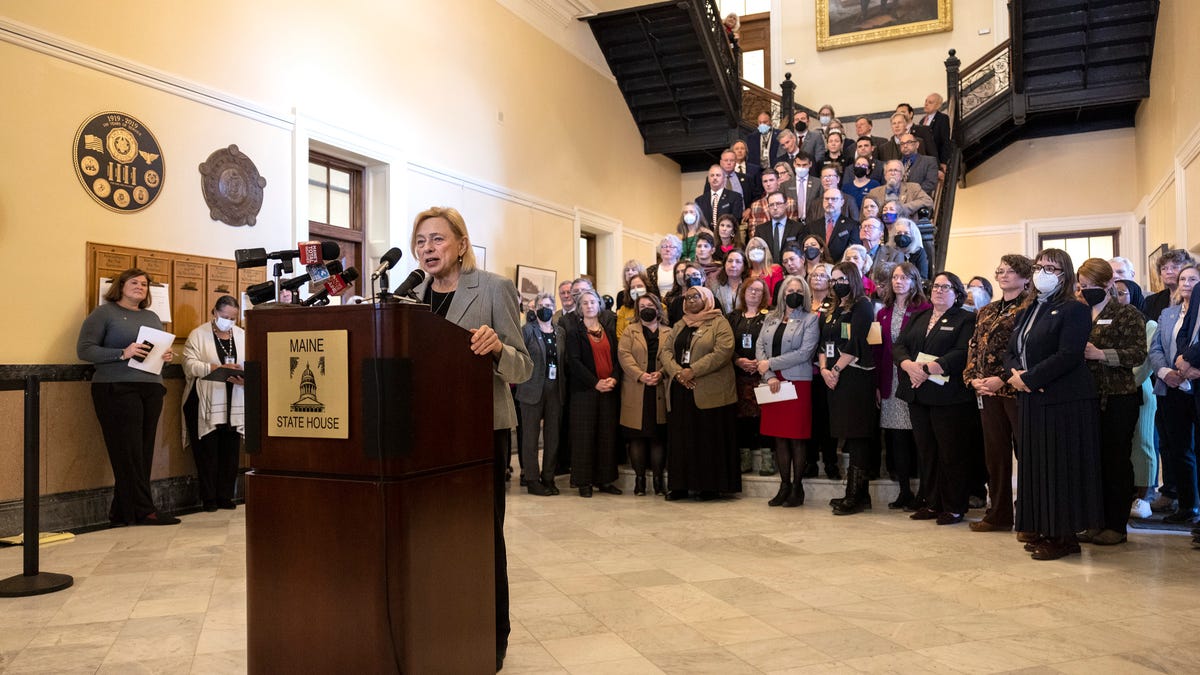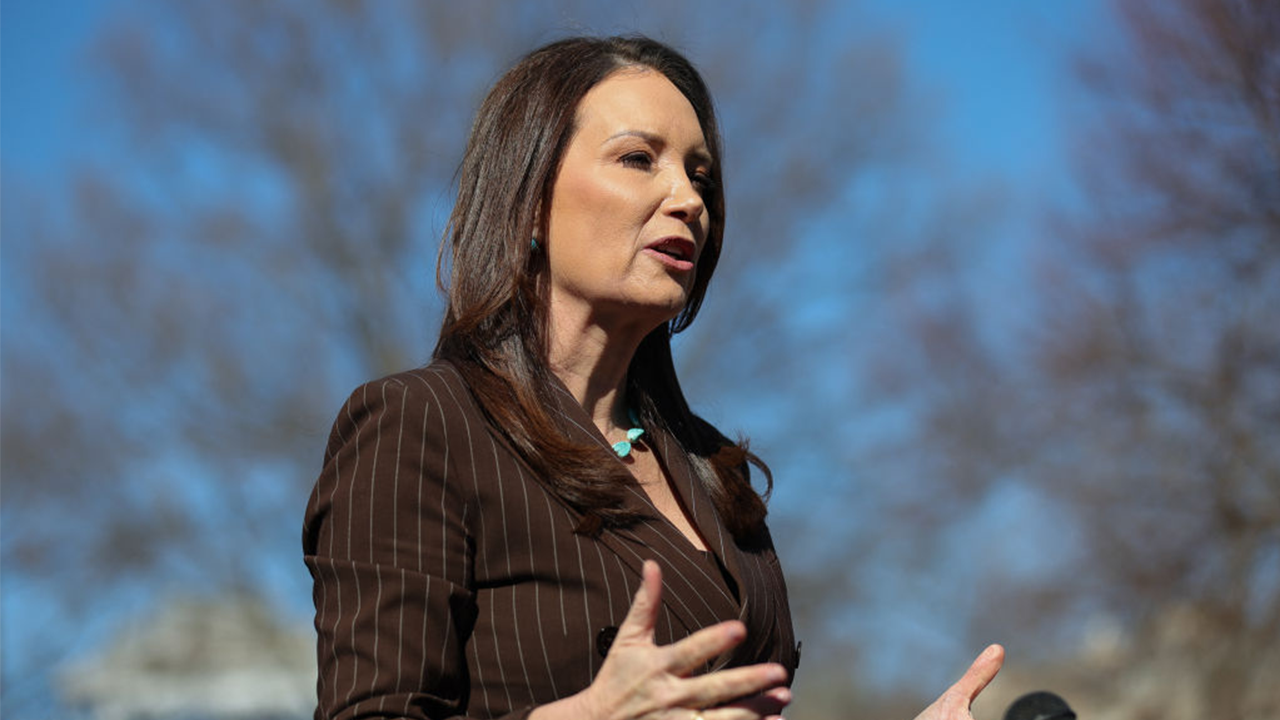Maine
Maine Is Set to Expand Abortion Access, Become First State to Repeal Its Limit Post-Roe

Maine lawmakers have advanced and appear to have the votes to pass a bill that would remove gestational limits on abortion when a licensed physician determines the procedure is necessary, expanding access in the state. Currently, Maine restricts abortion after fetal viability, or about 24 weeks’ gestation, unless the health or life of the pregnant person is at risk.
Gov. Janet Mills (D) proposed the bill, Legislative Document 1619, which would update the state’s Reproductive Privacy Act to give doctors more control over when an abortion is deemed appropriate. The bill also removes criminal penalties for providers and for people who help someone self-manage an abortion.
Currently, seven states allow medical providers to offer abortion throughout pregnancy: Alaska, Colorado, New Jersey, New Mexico, Oregon, Vermont, and Washington D.C. (which isn’t technically a state but absolutely should be). The House passed LD 1619 on Thursday night by a vote of 74 to 72. If the Senate passes the measure, Maine would become the first state to repeal its gestational limit in the wake of the Dobbs decision.
People need abortions later in pregnancy for many reasons, including new diagnoses, late recognition of pregnancy, and barriers to getting care when they wanted it. In the year since the Supreme Court overturned Roe, providers are seeing even more people seeking abortions later in pregnancy.
Mills has cited as her inspiration for the bill the story of Dana Peirce, a woman who learned at 32 weeks pregnant that her fetus wasn’t viable and had to travel to Colorado for an abortion.
Expanding access to abortion is a good thing on its own, but it’s especially interesting to consider the bill in the context of one U.S. Sen. Susan Collins (R), the least popular senator in the country. Collins, who claims to support abortion rights, was a deciding vote to confirm both Justices Neil Gorsuch and Brett Kavanaugh, who voted to overturn Roe. (Collins was a no on Amy Coney Barrett, likely knowing Republicans didn’t need her vote, which occurred mere days before her 2020 re-election.) She even said she thought people were being alarmist about Kavanaugh’s crystal clear record on abortion. When Roe fell four years later, the Maine senator claimed she’d been duped by Gorsuch and Kavanaugh.
Collins bears a lot of responsibility for the fall of Roe, and now her home state is on the verge of expanding access that’s all the more crucial in the wake of the 14 state bans—and counting—that she wrought.

Maine
Rally to oppose Maine's policy on transgender athletes draws crowd in Augusta

Several hundred people rallied at the State House on Saturday to oppose policies allowing transgender athletes to compete in girls’ and women’s sports in Maine.
Rally-goers held signs declaring “Protect our girls” and “No men in women’s sports” as they listened to roughly a dozen speakers. Those included a high school athlete from Presque Isle who said she has had to compete against biological males, as well as multiple Republican state lawmakers who argued that Maine’s policy puts young female competitors at an unfair competitive disadvantage as well as at physical risk.
Republican Rep. Liz Caruso of Caratunk was among several lawmakers who urged attendees to also show up for future hearings on bills to reverse Maine’s current policy allowing athletes to compete in sports based on their “gender identity.”
“As much as I am grateful for the national attention that has been coming to Maine, really none of this is going to change anything unless we change something in that building right there,” Caruso said while motioning to the State House.
Maine has been in the national spotlight ever since another Republican state lawmaker, Rep. Laurel Libby of Auburn, posted on social media the picture and name of a high school transgender athlete who had won a girls’ track and field championship. The post quickly went viral and eventually came to the attention of President Donald Trump, who had signed an executive order banning transgender athletes from women’s and girls sports.
Trump later publicly clashed with Gov. Janet Mills in a brief-but-tense exchange that drew national attention. When Trump pressed Mills on whether Maine would comply with the executive order, the governor said the state was following state and federal law and that she would “See you in court.”
The Trump administration responded with investigations into Maine’s compliance with Title IX, the federal civil rights law prohibiting discrimination against women in educational settings. The administration has also sought to withhold millions of dollars in federal funding from the state, although some was later restored.
Many attending Saturday’s “Girl First” rally wore pro-Trump hats and clothing. And all of the lawmakers who spoke were Republican, although numerous polls suggest that a large majority of Americans oppose allowing transgender athletes to compete in girls’ and women’s sports.
Saturday’s rally featured Chloe Cole of California, who received transition treatment and surgery as a young teenager but who now advocates nationally against gender-affirming care.
“Maine’s Human Rights Act was amended four years ago to include gender identity as a protected characteristic,” Cole said. “But we all understand that it is not a human right for a man to assert himself as a woman and to infringe upon real women’s fairness, privacy and safety.”
Maine’s Human Rights Act prohibits discrimination in school extracurricular activities based on the individual’s “gender identity.” The Maine Principals’ Association has said its policy is based on that state law but that only two transgender athletes are competing in high school sports statewide.
Rep. Laurel Libby, the Auburn lawmaker whose social media post helped re-ignite the debate over transgender athletes in Maine, was notably absent from Saturday’s rally, at least at the microphone.
Democrats censured Libby in the Maine House for her post, accusing her of endangering the welfare of the juvenile athlete for political purposes. Libby responded by suing House Speaker Ryan Fecteau, alleging the censure violates her and her constituents constitutional rights because she is not allowed to speak or vote on the House floor until she formally apologizes.
Maine
MAINE VS BRYANT PREDICTION, PICKS & ODDS FOR TODAY'S AMERICA EAST CHAMPIONSHIP GAME

The Bryant Bulldogs have had the Maine Black Bears’ number this year, and that’s reflected in the spread for the America East Championship. Our college basketball betting picks will lay the points with Bryant.
Photo By – Imagn Images. Bryant Bulldogs guard Rafael Pinzon in NCAAM action.
It will be the third and final time the Maine Black Bears and Bryant Bulldogs will square off this season — with the stakes never higher. The winner will take the America East Conference Tournament, and the automatic berth for the NCAA Tournament.
The Bulldogs, who have won both prior matchups, are 7-point favorites in the college basketball odds ahead of Saturday’s 11:00 a.m. ET tip-off on ESPN2 from the Chace Athletic Center in Smithfield, RI.
Our Maine vs. Bryant predictions and college basketball picks have the Bulldogs completing the three-peat to get to the dance.
Who will win Maine vs Bryant?
The Bryant Bulldogs have been the best team in America East all season, and they have been dynamite coming down the home stretch, with just two losses in their last 18 games.
They boast the top offense in the conference, pouring in 82.5 points per game, a full 11 points better than the Maine Black Bears, who ranked fifth in the nine-team conference. Bryant’s defense wasn’t otherworldly, but it didn’t have to be. Their Bottom 3 scoring defense of 74.3 points was mostly outscored by their offense.
Maine does have the second-best scoring defense in America East, at 65.7 points per game, but that hasn’t stopped Bryant from imposing its will. The Bulldogs hit the 80-point plateau in both head-to-heads, crushing the Black Bears by 26 in their first meeting, and topping them by eight in the rematch on March 1.
Bryant has rolled by double digits in both tourney games so far and are my pick to advance to the NCAA Tournament.
Maine vs Bryant prediction
My best bet: Bryant -7 (-110 at bet365)
The big question will be if the Maine Black Bears can play the upset card in their biggest game of the year, as they’ve also been given a seven-point cushion to cover.
The Black Bears opened the AEC Tournament with a 72-64 win over UMass Lowell, before putting the vice grips on Vermont in a 57-42 romp.
Maine wasn’t a slouch during the regular season, going 20-13 and finishing third in conference play at 10-6.
They were underdogs just 11 times on the year, going 6-5-0 against the spread. Only twice were they longer than 7-point dogs, but they were within the first two weeks of the season, failing to cover as 32-point dogs to top-ranked Duke, and covering as 8-point dogs vs. Richmond.
For all the success that the Bryant Bulldogs have had this year, they weren’t a great cover at a spread greater than seven points.
In the 12 games they were favored by at least that total, they finished 5-7-0 ATS. The two most recent instances have been in this tournament, winning by 13 as 10.5-point favorites over Albany, but failing to cover a 15-point spread in an 11-point win over UMBC.
But they’ve covered in both games against Maine, keeping their shot totals down by dominating the glass. In Bryant’s 81-55 win, the Bulldogs enjoyed a +21 rebounding edge, limiting Maine to 53 field goal attempts.
In the 80-72 win, Bryant had a +8 rebounding edge, including +6 on the offensive glass, and the Black Bears only had 56 field goal attempts.
Bryant is the top rebounding team in the conference, and Maine is the last, and that gap should help the Bulldogs cover this matchup for a third straight time.
Maine vs Bryant same-game parlay (SGP)

We can pencil in Bryant to hit the 80-point mark, as they’ve averaged 85 points a game on its current five-game win streak, failing to crack 80 points just once.
Maine’s offense hasn’t been great, but during their run of four wins in five games, they have scored at least 71 points in four of them, with the 57 against Vermont — the top scoring defense in AEC.
If the Black Bears’ defense is as porous as its average on the season, this should be an easy cover.
Learn how to bet a same-game parlay with these helpful tips and strategies.
Cash your ML bets quicker with bet365’s early win payout
Take advantage of the early win payout at bet365, where any pre-game CBB moneyline bet gets paid out as a winner if your school goes up by 18+ points!
Learn more about this feature, and all of bet365’s offerings, with our comprehensive bet365 review.
21+. Gambling problem? Call 1-800-GAMBLER.
Maine vs Bryant odds
Maine vs Bryant live odds
Maine vs Bryant opening odds
- Spread: Maine +7.5 | Bryant -7.5
- Moneyline: Maine +271 | Bryant -333
- Over/Under: Over 142.5 | Under 142.5
Odds courtesy of bet365
Maine vs Bryant betting trend to know
The Bulldogs have won four straight head-to-head matchups. Find more college basketball betting trends for Maine vs. Bryant.
How to watch Maine vs Bryant
| Location | Chace Athletic Center, Smithfield, RI |
| Date | Saturday, 3-14-2025 |
| Tip-off | 11:00 a.m. ET |
| TV | ESPN2 |
Maine vs Bryant key injuries
Not intended for use in MA.
Affiliate Disclosure: Our team of experts has thoroughly researched and handpicked each product that appears on our website. We may receive compensation if you sign up through our links.
Pages related to this topic
Maine
Committee approves stopgap biennial budget, adds funding for Medicaid and urgent needs

-

 News1 week ago
News1 week agoGene Hackman Lost His Wife and Caregiver, and Spent 7 Days Alone
-

 Politics1 week ago
Politics1 week agoRepublicans demand Trump cut American legal association out of nominee process
-

 Politics1 week ago
Politics1 week agoAgriculture secretary cancels $600K grant for study on menstrual cycles in transgender men
-

 News1 week ago
News1 week agoStates sue Trump administration over mass firings of federal employees
-

 Movie Reviews1 week ago
Movie Reviews1 week ago‘Black Bag’ Review: Cate Blanchett and Michael Fassbender Cozy Up in Steven Soderbergh’s Snazzy Spy Thriller
-

 News1 week ago
News1 week agoWho Paid for Trump’s Transition to Power? The Donors Are Still Unknown.
-

 News1 week ago
News1 week agoTrump Seeks to Bar Student Loan Relief to Workers Aiding Migrants and Trans Kids
-

 Politics1 week ago
Politics1 week agoKristi Noem says 2 leakers accused of disclosing ICE operations ID'd: 'Put law enforcement lives in jeopardy'
















